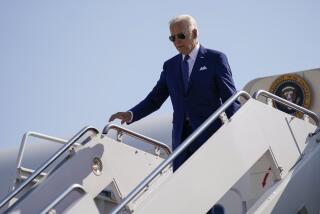Refugees Going Home Too Soon, Clinton Says
- Share via
PARIS — President Clinton expressed the fear Thursday that the refugees streaming back into Kosovo are returning too quickly, risking death or injury from land mines planted by the now-retreating Yugoslav forces.
But otherwise, the president offered nothing but upbeat reports in his first extended comments on Kosovo since allied forces began moving Saturday into the province of Yugoslavia’s dominant republic, Serbia. Even the lingering dispute with Russia over its deployment of troops earlier Saturday to the airport of Kosovo’s capital, Pristina, looked like it was near resolution, he said.
Still, after Clinton spent nearly three hours Thursday morning with French President Jacques Chirac at the Elysee Palace--the start of an extended weekend tour saluting with allied leaders the end of the fighting in Kosovo--potentially cantankerous discussions lay ahead over who will pay for reconstruction there, elsewhere in Yugoslavia and throughout the Balkans.
Using the acronym for the peacekeeping forces in Kosovo, Clinton said: “As of today, 26,000 Serb soldiers have left Kosovo, 15,000 of our KFOR forces have arrived. The refugees are coming home--indeed, in many cases, faster than we think safe, because of the land mines, which we are working hard to remove. But they want to go home.”
As the hand-over continues in Kosovo, Clinton said, he has been moved to see arriving allied troops receiving cheers. He said it was “also moving to see our soldiers uncovering evidence of what we stood against--evidence of mass graves, evidence in the form of the piles of documents stripped from the refugees to erase their identities.”
During their joint news conference, the U.S. and French presidents did not discuss in detail an issue that probably will come up this weekend in Cologne, Germany, where Clinton arrived Thursday evening. There, at the 25th annual summit of seven leading industrial nations and, in recent years, Russia--the Group of 8--the extent of the allies’ coming contribution in Kosovo and the Balkans will be on the agenda. Of the seven other summit partners--Britain, Canada, France, Germany, Italy, Japan and the United States--all but Japan are members of the North Atlantic Treaty Organization, which carried out an 11-week air campaign against Yugoslavia.
“There’s a parallel we’re drawing: We bore the brunt of the air commitment. It’s now Europe’s turn to bear the brunt of the reconstruction aid,” a White House official said of the United States’ dominant role in the air war.
The question of who helps rebuild Kosovo--and eventually contributes to the development of the Balkans, at an estimated cost of $30 billion--and under what conditions foreshadows a broad debate over the future of a unified Europe and the role of its defense and economic institutions in the opening years of the new century.
Clinton has equated the assistance to the Marshall Plan that revived Western Europe half a century ago after World War II, though the aid then was, relatively speaking, on a much greater scale.
There was no disagreement between Clinton and Chirac on Thursday over the conditions that must be met for any of that assistance to reach the Yugoslav government and areas of Serbia outside of Kosovo: There can be no continuing role for Yugoslav President Slobodan Milosevic.
More to Read
Sign up for Essential California
The most important California stories and recommendations in your inbox every morning.
You may occasionally receive promotional content from the Los Angeles Times.













